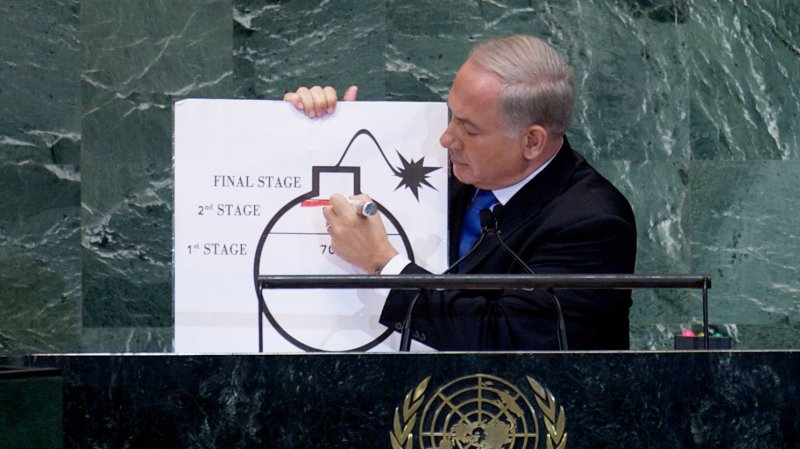Isrsaeli Prime Minister Binyamin Netanyahu draws a red line on an illustration of a bomb representing Iran's nuclear program, as he addresses the 67th session of the General Assembly at the United Nations in New York, Sept. 27, 2012. UPI/Monika Graff |
License Photo
WASHINGTON, Sept. 28 (UPI) -- U.S. President Barack Obama and Israeli Prime Minister Binyamin Netanyahu "discussed a range of security issues" in a phone call Friday, the White House said.
The discussion followed up on Netanyahu's meeting with Secretary of State Hillary Clinton Thursday in New York, the White House said in a news release.
"The two leaders discussed a range of security issues, and the President reaffirmed his and our country's unshakeable commitment to Israel's security," the release said. "The two leaders underscored that they are in full agreement on the shared goal of preventing Iran from obtaining a nuclear weapon. The Prime Minister welcomed President Obama's commitment before the United Nations General Assembly to do what we must to achieve that goal."
The White House said Obama and Netanyahu "took note of the close cooperation and coordination between the Governments of the United States and Israel regarding the threat posed by Iran -- its nuclear program, proliferation, and support for terrorism -- and agreed to continue their regular consultations on this issue going forward."
The phone call came one day after Netanyahu said during his speech at the United Nations he appreciated Obama's support for Israel's efforts to prevent Iran from acquiring nuclear weapons.
A State Department official said Clinton and Netanyahu met for about 75 minutes and had "an in-depth discussion on Iran, and reaffirmed that the United States and Israel share the goal of preventing Iran from acquiring a nuclear weapon."
Some Obama critics have said the president snubbed the Israeli leader by not meeting with him in person. The White House denied the allegation.
Officials denied Israeli media reports saying Obama refused an Israeli request for a meeting with Netanyahu in Washington, saying such a request was never made.
The two leaders have had a public dispute over how to confront Iran over its nuclear program.
Netanyahu Thursday thanked Obama before the U.N. General Assembly for a warning Obama gave Iran in his own General Assembly speech Tuesday.
Obama said he would not tolerate a nuclear-armed Iran and said time was running out before Washington would consider options beyond diplomacy and sanctions to ensure Iran doesn't obtain nuclear arms.
"I very much appreciate the president's position, as does everyone in my country," Netanyahu said.
The Israeli leader emphasized Israel's solidarity with the United States, saying, "Israel is in discussions with the United States over this issue, and I am confident that we can chart a path forward together."
His remarks were widely viewed as attempting to smooth over differences with the Obama administration over the urgency of what both countries view as an Iranian nuclear threat.
Netanyahu, who said Washington and Jerusalem were working toward a "common goal" on Iran, said his deadline for a military strike was well past November's U.S. presidential election -- perhaps as late as next summer.
The White House and U.S. military planners had worried about a possible "October surprise" attack by Israel, The New York Times reported.
U.S., Israeli and European officials, supported by U.N. weapons inspectors, maintain Iran plans to build nuclear weapons.
Tehran insists its nuclear program is for peaceful civilian uses only.
In meetings with reporters and academics during the General Assembly, Iranian officials, including President Mahmoud Ahmadinejad, refused to rule out the possibility Iran would continue producing 20 percent-enriched uranium, even though it has enough to run its medical reactor for six to 10 years, the Times said.
Twenty-percent enrichment puts Iran on the cusp of weapons-grade uranium.















